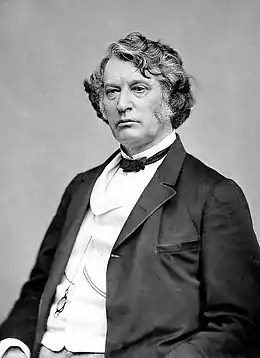Grantism
Grantism is a derisive term of United States origin referring to the political incompetence, corruption, and fraud, during the administration of President Ulysses S. Grant. His Presidency, from 1869 to 1877, was marred by many scandals and fraudulent activities associated with persons within his administration, including his cabinet, which was in continual transition, divided by the forces of political corruption and reform.[1] Among them were: Black Friday, corruption in the Department of the Interior, the Sanborn incident, and the Whiskey Ring. (The Crédit Mobilier scandal, although exposed during his tenure, is not considered a Grant scandal.)
Grantism | |
|---|---|
 President Grant Circa 1870 | |
| 18th President of the United States | |
| In office March 4, 1869 – March 4, 1877 | |
| Personal details | |
| Born | Hiram Ulysses Grant April 27, 1822 Point Pleasant, Ohio, U.S. |
| Died | July 23, 1885 (aged 63) Wilton, New York, U.S. |
| Resting place | General Grant National Memorial Manhattan, New York |
| Political party | Republican |
| ||
|---|---|---|
18th President of the United States
Presidential elections
Post-presidency
 |
||
The term Grantism was coined by his political opponents and by Lost Causers. Some historians defend Grant, noting that he was the first President to establish the Civil Service Commission, had reformers in his Cabinet, and ended the corrupt system of privateer tax collectors profiteering by taking a percentage of delinquent taxes. His enemies wanted to undermine the moral integrity of his administration and for his enforcement of African American civil rights during Reconstruction.
Grant, ever trusting of associates, was himself influenced by both forces. The standards in many of his appointments were low, and charges of corruption were widespread.[1] Although not directly involved with these scandals, the president's associations with people of questionable character and his reliance on cronyism, nepotism, and political patronage gave rise to accusations of "Grantism". Historians agree that corruption in the Grant administration was due to Grant's unqualified appointments of close friends and family, and remain perplexed why he protected his personal secretary Orville E. Babcock.
Origins

The term "Grantism" was originally coined by fellow Republican Senator Charles Sumner of Massachusetts in a speech on May 31, 1872, a Presidential election year. It was used by Sumner to differentiate the Republican Party from Grant. The two men had been political enemies ever since Sumner's refusal to annex Santo Domingo to the United States. Sumner accused Grant of political patronage, nepotism, and being an autocrat like Julius Caesar.
Sumner charged that Grant had hindered African American national sovereignty rights in the Caribbean with the annexation proposal of Santo Domingo. Sumner was also angry that Grant used his personal secretary to establish international relations with Santo Domingo, rather than acting through the State Department and Congress. Sumner summed up Grantism as a despotic government of "one man and his personal will".[2] The lengthy speech was used as the political platform for the Liberal Republican Party and launched the short-lived political career of Horace Greeley as the party's presidential candidate in 1872.
Grant as reformer
Historian Louis Arthur Coolidge noted that although Grant had critics, including Sumner, concerning presidential patronage, he was the first president to advocate and sign into law civil service reform legislation on March 4, 1871.[3] Grant said that the "elevation and purification of civil service of the government will be hailed with approval by the whole people of the United States".[3] The historians H. Wayne Morgan and Ari Hoogenboom say that Grant's presidential reputation for corruption has been exaggerated.[4] Grant placed leading reformer George William Curtis as head of the civil service commission set up to establish regulations, in order to ensure the best person qualified would hold office.[3] In addition to signing the civil service reform, Grant limited and finally abolished the moiety system in which private citizens contracted as Treasury revenue agents and received a percentage of delinquent taxes assessed and collected.[4]
Modern definitions
The Liberal Republicans defined "corruption in government" to mean Grantism from 1873–1875.[5] The Liberal Republicans ceased to exist after the reforming Democratic Party assumed a majority in the United States House of Representatives from 1875–1881. After assuming control of the House, the Democrats launched a series of corruption investigations into the Grant Administration from 1875–1876. Today, "Grantism" is defined as any political corruption and greed in government. During Grant's presidency, many of his associates took part in price skimming and tax evasion. More generally, "Grantism" may also refer to "big business" undermining democratic control of local and national government.
References
- Hinsdale, Mary Louise (1911). A History of the President's Cabinet. Ann Arbor, MI: G. Wahr. pp. 207, 212–213.
A history of the President's cabinet.
- Sumner, Charles (May 31, 1872). "Republicanism vs. Grantism".
- Coolidge (1922), Ulysses S. Grant, pp. 399-400
- McFeely-Woodward (1974), Responses of the Presidents to Charges of Misconduct, pp. 133-134
- "Reconstruction The Second Civil War". December 19, 2003.

